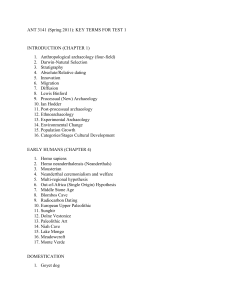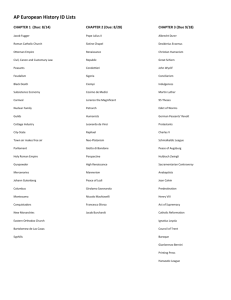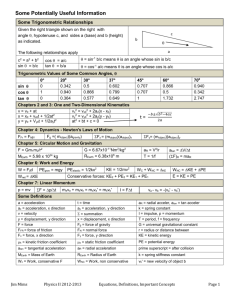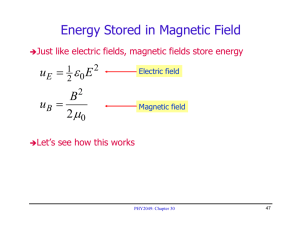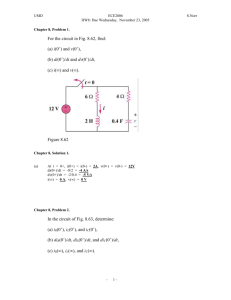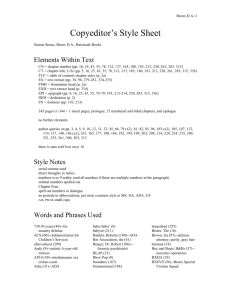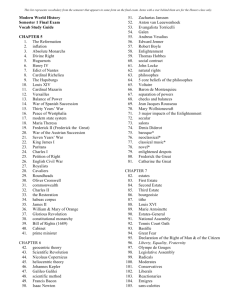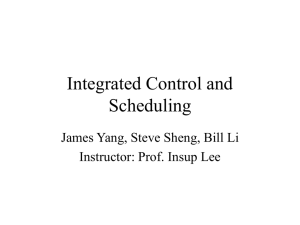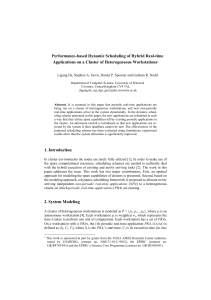teachingplan-july2010
advertisement
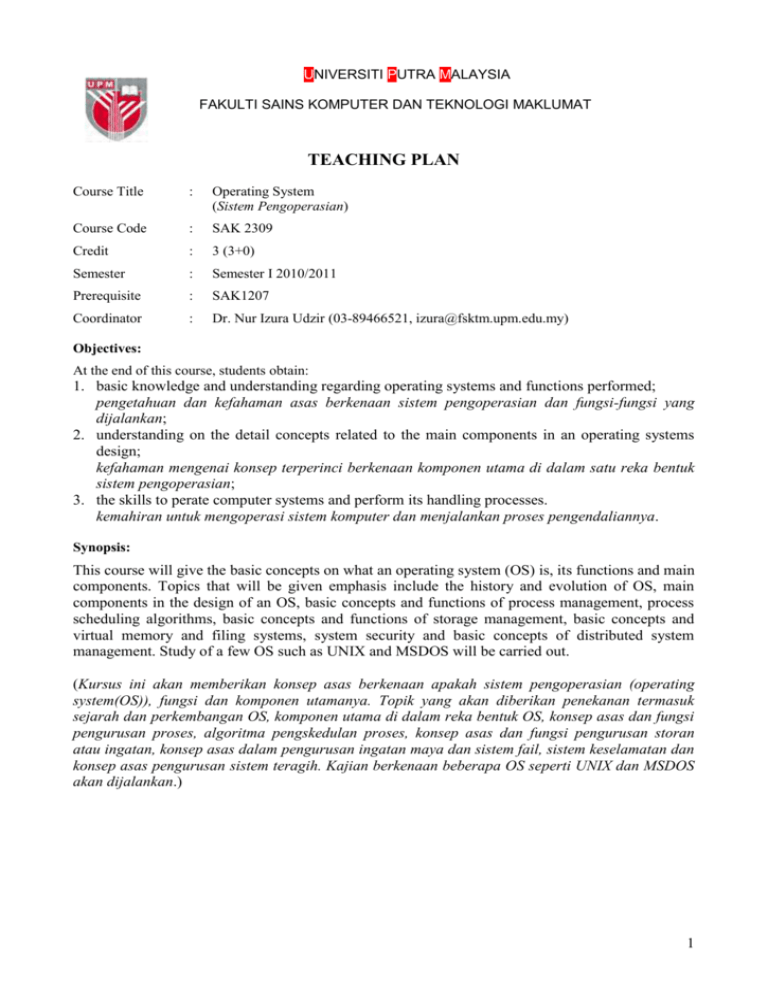
UNIVERSITI PUTRA MALAYSIA FAKULTI SAINS KOMPUTER DAN TEKNOLOGI MAKLUMAT TEACHING PLAN Course Title : Operating System (Sistem Pengoperasian) Course Code : SAK 2309 Credit : 3 (3+0) Semester : Semester I 2010/2011 Prerequisite : SAK1207 Coordinator : Dr. Nur Izura Udzir (03-89466521, izura@fsktm.upm.edu.my) Objectives: At the end of this course, students obtain: 1. basic knowledge and understanding regarding operating systems and functions performed; pengetahuan dan kefahaman asas berkenaan sistem pengoperasian dan fungsi-fungsi yang dijalankan; 2. understanding on the detail concepts related to the main components in an operating systems design; kefahaman mengenai konsep terperinci berkenaan komponen utama di dalam satu reka bentuk sistem pengoperasian; 3. the skills to perate computer systems and perform its handling processes. kemahiran untuk mengoperasi sistem komputer dan menjalankan proses pengendaliannya. Synopsis: This course will give the basic concepts on what an operating system (OS) is, its functions and main components. Topics that will be given emphasis include the history and evolution of OS, main components in the design of an OS, basic concepts and functions of process management, process scheduling algorithms, basic concepts and functions of storage management, basic concepts and virtual memory and filing systems, system security and basic concepts of distributed system management. Study of a few OS such as UNIX and MSDOS will be carried out. (Kursus ini akan memberikan konsep asas berkenaan apakah sistem pengoperasian (operating system(OS)), fungsi dan komponen utamanya. Topik yang akan diberikan penekanan termasuk sejarah dan perkembangan OS, komponen utama di dalam reka bentuk OS, konsep asas dan fungsi pengurusan proses, algoritma pengskedulan proses, konsep asas dan fungsi pengurusan storan atau ingatan, konsep asas dalam pengurusan ingatan maya dan sistem fail, sistem keselamatan dan konsep asas pengurusan sistem teragih. Kajian berkenaan beberapa OS seperti UNIX dan MSDOS akan dijalankan.) 1 Course Contents: Week Topic 1 Chapter 1: Introduction Operating-System Structure and Operations Computer-System Organization and Architecture System Boot Registers Interrupts Operating System Operations Computing Environments Chapter 1: Introduction (cont’d) Operating System Services Microkernels System Calls System Programs 3 Chapter 2: Processes Process Concept Process Scheduling Operations on Processes Cooperating Processes Interprocess Communication Threads Threading Issues 4 Chapter 3: Uniprocessor Scheduling Scheduling Criteria Scheduling Algorithms 5 Chapter 3: Uniprocessor Scheduling (cont.) Scheduling Algorithms Multiple-Processor Scheduling Real-Time Scheduling 2 TEST 1 6 Chapter 4: Deadlock Principles of Deadlock Deadlock Prevention Deadlock Avoidance 7 Chapter 4: Deadlock (cont’d) Deadlock Detection Recovery from Deadlock 8 Chapter 5: Memory Management Swapping Contiguous Allocation Paging Segmentation Segmentation with Paging Chapter 6: Virtual Memory Demand Paging Page Replacement Demand Segmentation Transforming I/O Requests to Hardware Operations Performance TEST 2 Disk Management 9 10 11 Chapter 7: I/O Systems I/O Hardware Categories of I/O Devices Direct Memory Access Kernel I/O Subsystem Chapter 8: Secondary-Storage Structure Mass Storage Structure 2 12 13 14 Stable-Storage Implementation Tertiary Storage Devices Chapter 9: File Management File Concept Access Methods File Organization Directory Structure File Sharing Chapter 9: File System Implementation File Allocation Methods File Access and Protection Free-Space Management Efficiency and Performance Recovery Log-Structured File Systems Intrusion detection Malicious programs Antivirus approaches Disk Structure Disk Scheduling Chapter 10: Protection Types of threats Communication lines and network attacks Methods for Protection Assessments: 1. 2. 3. 4. 5. Quizzes Group Assignments Test 1 Test 2 Final Examination Assessment Test 1 : 10% : 10% : 20% : 20% : 40% Percentage 20% Topics Chapters 1 - 3 Format Structured questions Test 2 20% Chapters 4 - 5 Structured and applications (algorithm) questions Final exam 40% Chapters 1 - 11 Structured and applications (algorithm) questions Group Assignment 10% Case study on a chosen OS or lab assignments Written report and presentation Quiz 10% Carried out at the end of each chapter to assess the students’ understanding of the lessons. Prepared by the instructor, e.g.: - multiple choice questions - true/false questions - Structured questions Reference Books: 1. Silberschatz, A., Galvin, P.B. & Gagne, G. 2010. Operating System Concepts. 8th Edition, Wiley. 2. Stallings, W. 2009. Operating Systems: Internals and Design Principles, 6th Edition, Pearson. 3. Tanenbaum, A.S. 2009. Modern Operating Systems, 3rd Edition, Pearson. 3
